Статьи журнала - Arctic and North
Все статьи: 972
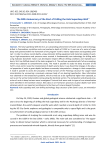
The 50th Anniversary of the Start of Drilling the Kola Superdeep Well
Статья научная
The Kola Superdeep Well (SG-3) is an outstanding achievement of Soviet science and technology, drilled in Precambrian crystalline rocks and reached a depth of 12262 m. It was one of a series of super deep wells planned within the framework of the program “Earth's Interior Exploration and Superdeep Drilling”. In order to achieve record depths, unique domestic drilling equipment and materials capable of working at high temperatures and pressures were created. A fundamentally new technology for drilling wells using hydraulic downhole motors was developed. Despite difficult drilling conditions and repeated accidents, SG-3 has fulfilled almost all the tasks assigned to it. The well was penetrated with full core sampling, which was subjected to comprehensive study. This made it possible to study the deep structure of the Earth's crust and to revise the interpretation of depth seismic data. It was found that changes in the physical properties of rocks at great depths had been erroneously interpreted as a change in their composition. It made it possible to assess the prospects of deep horizons of the Pechenga structure for copper-nickel mineralisation by uncovering a previously unknown body of ore-bearing hyperbasites. New information was obtained on the temperature gradient, which turned out to be significantly higher than expected, as well as on the vertical metamorphic zoning along the borehole section. The composition and physical properties of rocks in deep horizons were investigated. Tectonic fault zones and six types of ore mineralisation were identified in the borehole section. New data on ore formation processes at great depths have been obtained, which is an important contribution to the theory of mineral deposit formation.
Бесплатно

The Arctic Convoys and the Kara Expeditions (news from the British Center)
Статья научная
In her article the author comments on two important events connected with the exploration of the Arctic and the significant role it played during the WW2. Valentina Golysheva gives a retrospective view of “Dervish-75”, International Forum in NArFU and the “Kara Expedition” conference in Salekhard held in autumn of 2016.
Бесплатно
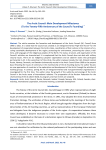
Статья научная
The article examines the formation and development of the Arctic Council (AC; Council) from 1996 to 2021. It is noted that the Council was created as an intergovernmental "high-level forum" for the development of cooperation between the Arctic states, coordination of their actions in the interests of ensuring sustainable development of the region, protecting the environment, preserving the culture, traditions, and languages of the indigenous peoples of the North. The status, structure, and organisation of the Council's activities are characterised. It is emphasised that the Arctic Council does not deal with military security issues. There are six indigenous peoples' organisations and 13 observer states that participate permanently in AC. In the second part of the article, the author analyses Canada, the USA, Finland, Iceland, Russia, Norway, Denmark, and Sweden chairmanship results in the Arctic Council (from 1996 to the present day). Revealing the issues of continuity in the chairmanship of the AC founding states, the author focuses on new approaches of countries in the exploration and development of the Arctic through the activities of working groups. In contrast, joining the AC of intergovernmental and non-governmental organisations is investigated for the first time. The author notes the growth of the authority and prestige of the Arctic Council in the Arctic arena of international relations. The preparation of the Russian Federation for the chairmanship of the AC (2021–2023), its program, and main events are analysed.
Бесплатно
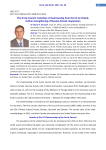
Статья научная
The article deals with the results of the 2 years of the US chairmanship of the Arctic Council, notes positive results and draws attention to the weak points of the US Arctic policy. It reveals that the US has chaired the AC to solve its own problems related to the Arctic. The authors also analyze the ministerial meeting in Fairbanks (Alaska) and describe the current Russian position in the Arctic. The foundations of the Finnish Arctic policy and the analysis of the first statements of politicians and experts helps the author to predict the Finland's plans for the chairmanship in the Arctic Council 2017–2019, and its possible impact on settling differences in Russian-American and Russian- Western European relations. In addition, it is important to take a closer look at the role of the Finland’s chairmanship in strengthening the Russian-Finnish cooperation in the run-up of the 100 anniversary of the independent Finnish state (December 2017). It is found that in contrast to Canada, the United States did not transfer the existing contradictions between the US and Russia to the work of the Arctic Council. It largely contributed to the positive results of the US chairmanship, especially on the development of multilateral cooperation of the coast guards, international fisheries in the Arctic Ocean and the problems of communication networks in the Arctic.
Бесплатно
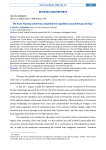
The Arctic Floating University completed the expedition around Novaya Zemlya
Статья научная
The article presents a review of the expedition “Arctic Floating University — 2018”, the thematic name of which was “Terrae Novae”. The expedition passed through 3,800 nautical miles along the White, Barents, Kara and Pechora Seas. Its participants completed landings on two arctic archipelagoes: Solovetsky Islands and Novaya Zemlya. The expedition had three stages. At the first stage, marine research was made in the White and Barents seas. In total, 48 stops were made, and deep sounding was carried out at each hydrological station. At the second stage, marine and ground research was made in the Barents Sea. The third stage included work on hydrological sections in the Kara Sea and ice condition monitoring along the area. The expedition research team made seven landings on the Arctic archipelagos of Novaya Zemlya and Solovetsky. Samples of soil were taken, and specific studies of the atmosphere, water, marine biology, flora and fauna of the area were carried out. The obtained materials contain new data on the development of a monitoring methodology, assessment of forecasting and prevention of risks associated with biological transport of highly toxic pollutants that can accumulate in food chains and spread to Arctic ecosystems; the study of endoliths; paleomagnetic studies; microplastic studies; marine microfauna for investigating the settling history of the Barents Sea, etc.
Бесплатно
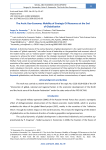
The Arctic Geo-Economy: Mobility of Strategic Oil Resources at the End of Globalization
Статья научная
A distinctive feature of the cyclical dynamics of global development is the rapid transformation of the maxim of “global superiority” into softer forms of leadership on the geopolitical and economic atlas of the modern world, such as “national power” and/or “regional advantage”. This requires a concentration of resources to achieve the latter's mobility on the strategic movement trends of contemporary Russia. The importance of oil and petroleum products in the formation of the Russian Federal Budget and the National Welfare Fund cannot be overestimated. Today, oil is essentially the main source for the successful implementation of the special military operation and, at the same time, ensuring the progressive development of Russia. The article substantiates the necessity to maintain the economic turnover of oil resources development, including in the Arctic, carries out an expert assessment of three options for the development of oil production: reduction of production; reduction of oil exports against the background of increasing domestic consumption; and ensuring the mobility of export supplies to find and develop new markets.
Бесплатно
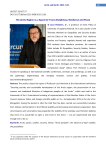
The Arctic Region as a Space for Trans-disciplinary, Resilience and Peace
Статья научная
The article is based on report of Professor Lassi Heininen at the international conference "Ensuring security and sustainable development of the Arctic region, the preservation of ecosystems and traditional lifestyles of indigenous peoples of the Arctic", which was held in the framework of the V International meeting of representatives of the Member States of the Arctic Council, observer States and foreign scientific public on 15—16 September 2015 in the city of Arkhangelsk1. During the period in after the Cold War has been carried out successfully transition from military confrontation to the Political stability and increasing international cooperation. New circumstances and uncertainty may jeopardize the stability of the existing. Lassi Heininen believes that none of us would like to open a new front in the Arctic — we are experienced and wise enough not to do so.
Бесплатно
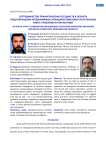
Статья научная
This article has the following research objectives: first, to make an analysis of the international legal basis for the Arctic states’ cooperation on emergency situations prevention and search and rescue operations; second, to study the existing cooperative experiences at the biand multilateral levels; third, to suggest some practical recommendations to improve such a cooperation from the Russian national interests’ point of view.
Бесплатно
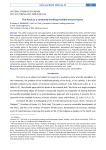
The Arctic as a constantly evolving multidimensional space
Статья научная
The author analyzes the main approaches to the multidimensionality of the Arctic and the factors that enhance the role of the Arctic in modern conditions. Special attention is paid to the research made by NArFU (Yu.F. Lukin) and the Institute of Europe of RAS (N.M. Antyushina). In conclusion the author underlines the need for systematic work on the Arctic consciousness and involvement of the Russian citizens in the Arctic affairs. Along with the analysis of the growing role of Russia and the European countries in the Arctic, the article is concerned with cooperation between Russia and China. It is revealed that Beijing's cur-rent foreign policy in the Arctic is productive, businesslike, benevolent and long-term for Russia. The emerging problems and difficulties are resolving through negotiations on a mutually beneficial basis. It is also concluded that the presence of large Asian states in the Arctic Council leads to a deescalate tensions due to disagreements between Russia and the West over the situation in Syria and Ukraine. The author tried to determine the level of militarization in the Arctic and its impact on the possibility of conflicts in the region. It is concluded that in modern conditions a long-term Arctic megaproject could become a powerful Arctic consolidation factor. In the article, the author uses methods of political science and humanities: comparative analysis, historical approach, institutional and prognostic methods, incl. the analysis of possible scenarios for the further development of the Arctic Council by Yu.F. Lukin.
Бесплатно
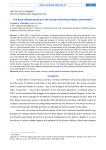
The Arctic defense postures in the context of the Russia-West confrontation
Статья научная
In 2015–2017, in most Arctic countries, a planned review of defense policy was carried out. It coincided with the Ukrainian crisis, the aggravation of relations between Russia and the West and the active phase of the implementation of a large-scale program of military construction in the Russian Arctic. An analysis of the decisions made during this period allows us to judge to what extent the confrontation between Russia and the West has affected the military and political situation in the region and how it can affect it in the foreseeable future. For this purpose, the documents of the strategic military-political planning of the Arctic countries adopted in recent years are compared with their earlier plans for military construction in the Arctic. The analysis allows to conclude with a high degree of certainty that in the short term the military and political situation in the region will remain stable and predictable. The Arctic countries have not reconsidered their previous calm assessments of military threats and modest military development programs in the region. The main attention of the Arctic states-members of NATO is concentrated on the Arctic not that much as it is for the development of the military-political situation in the Baltic and in the North Atlantic. However, the longer the current crisis in the relations between Russia and the West goes on, the more likely that in the medium and long-term perspective, the military and political situation in the Arctic will change for the worse.
Бесплатно
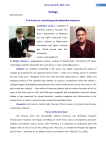
The Arctic ice: monitoring and adaptation measures
Статья научная
Ice condition monitoring in the Arctic seas allows evaluating the impact of changes by analyzing the two opposite points of view — Arctic ice is melting and ice is included into the “cold cycle”. Histogram of the area with the Arctic paleocrystic ice (2002—2013), and statistical analyze of the collected data allowed to construct a polynomial trend that defines a sufficient degree of probability and predicted values of the minimum area of the Arctic sea ice. The best model was selected — the method of harmonic balance and the interval forecasts of the ice cover of the Arctic seas for 2015 and 2016 were composed. Risk consideration under the climate change is very important for mining industries, maritime navigation and infrastructure in the Russian Arctic, in order to minimize losses arising from possible threats.
Бесплатно
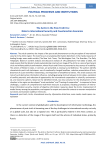
The Arctic in the Post-Truth Era: Risks to International Security and Counteraction Scenarios
Статья научная
The article examines the impact of the post-truth phenomenon on the perception of international security in the Arctic region. The main focus is on analyzing information distortions in the media resources of leading foreign mass media outlets (The New York Times, The Washington Post, The Guardian, The Daily Telegraph). Based on content analysis and discourse analysis of 176 publications from 2022 to 2025, the study reveals that the Western media systematically constructs an image of the Arctic as a zone of permanent crisis and military-political confrontation, where Russia and China are presented as key sources of instability. The actions of Western states, in contrast, are presented as necessary and defensive. The authors identify characteristic post-truth techniques: use of emotionally charged headlines, selective presentation of facts, distortion of cause-and-effect relationships, and imposition of simplified narratives. The article assesses the risks of such destructive information influence, including growing mistrust between Arctic states, escalation of conflict potential, and reduction of opportunities for international cooperation in scientific, environmental, and economic spheres. Based on the identified trends, two key scenarios for the development of the situation in the region are developed: “acute escalation” and “freezing of cooperation”. In response to these challenges, a system of comprehensive multi-level measures is proposed, including promotion of international information security, creation of objective information resources about the Arctic, improvement of media literacy among the population, and support for expert and scientific contacts to counter manipulative narratives and maintain stability in the Arctic.
Бесплатно
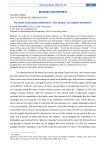
The Arctic in the Soviet cinema lens: “Two Oceans” by Vladimir Shneiderov
Статья научная
The study aims at introducing unstudied materials, i.e., film documents of the Soviet period, related to the development of the Russian North, into the scientific circulation. So-called expedition films occupied a special place in the history of Soviet visual anthropology — films of educational content about the peoples and territories of the USSR. They reached its heyday at the turn of the 1920s — 1930s. One of the pioneers of Soviet visual anthropology is considered to be the filmmaker V.A. Shneiderov, the author of a series of films about the USSR territories (“The Great Flight”, “The Pamirs (the bottom of death)”, “At the height of 4500”, etc.). In addition to solving creative issues, the production of such films was part of a state experiment on the construction of local images and the country. The Soviet authorities used the resources of the cinematographer as a media source and agitation. In this article, the author considers the example of the expedition film “Two Oceans”, the classic of documentary films where V.A. Shneiderov pictured the history of the Northern Sea Route and the Soviet colonization of the Arctic. The context of the filmmaking, i.e., parallel processes in Soviet cultural politics and cinema, is discussed as well. The author conclusions contain thoughts about the research value of the Soviet expeditionary film as a complex historical source.
Бесплатно
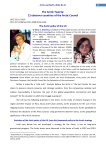
Статья научная
The article describes the evolution of the British Arctic strategy, the role of the British political institutions in this process, as well as the interests and policy priorities for the region. It is noted that currently the focus of the UK is addressed to the study of the environment state in the Arctic, as well as on climate change. In the future, with the development of the Arctic technology and increasing scrutiny of the area the interest of the Kingdom to natural resources of the Arctic zone will increase, as well as its military and defense interests in the region.
Бесплатно
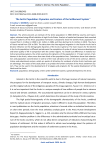
The Arctic population: dynamics and centers of the settlement system
Статья научная
The article presents an estimate of the Arctic population in 1900-2019 by country and macro-region, obtained using official statistics of eight Arctic States. Analysis of spatial and temporal data revealed the main patterns of the Arctic population formation. Calculations show the world’s Arctic population increased from 1.3 million in 1900 to 6.1 million in 1989, and then declined to 5.4 million in 2019. The share of Russia varied from 22% to 58%. The data show that interregional migration in the Russian Arctic had a decisive influence on the demographic dynamics of the Arctic in general. The main reasons for the decline in the Arctic population in different periods were the completion of cycles of natural resource development and lower quality of life in comparison with the central regions. To smooth out differences in national statistical accounting systems, the article examines the dynamics of the population in 17 major centers of settlement in the Arctic, where more than two-thirds of the population lives. Calculations show that urbanization and population concentration in several of the most attractive areas of the Arctic continue. Administrative and educational centers, which are points of attraction for residents of other Arctic territories, get an advantage. The results of the study allow us to predict the further evolution of the Arctic settlement system. They can be used in the development of strategies and programs for the spatial development of the North and the Arctic.
Бесплатно
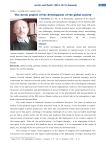
The Arctic project to a global society
Статья научная
The article investigates the spiritual, moral and historical grounds of objectively formation of a global society in the world content integrity. Expands the historical logic of the development of world society as the rise of social practice from the requirements of natural necessity to creative strategies, universal freedom. Substantiates the key role of the Arctic in a humanistic civilization and consolidation of humanity.
Бесплатно
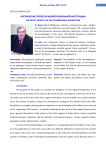
The Arctic projects of the interregional integration
Статья научная
The problems of the interregional integration in the Russian Arctic, as the example of the White Sea and the planned Arctic union of the regions of Russia.
Бесплатно
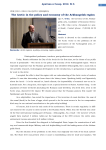
The Arctic regions in the policy and economy of Arkhangelsk area
Статья научная
Article is devoted to the consideration of the Arctic vector in the politician of the government of the Archangelsk area, region and economy.
Бесплатно
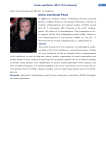
Статья научная
This article presents the first experience of philosophical understanding of the Arctic phobias as a social phenomenon. Phobias are here considered not like as obsessive fears or apprehensions of the individual, as well as long-term threat, anxiety, expectations of social communities and groups related to Arctic issues and requiring their conceptual analysis. We try to make an attempt to identify social phobias, their classification of content studied philosophy Homo sapiens, and fears of modern Russians. It is opened polifobiya of the Arctic environment, Arctic social and cultural phobias, fears of HAARP, climatic changes, with the polar Russo phobia with Arctic performances.
Бесплатно
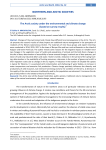
The Arctic society under the environmental and climate change (based on survey results)
Статья научная
Changes of the environment and climate have different local consequences in the Arctic. The article presents the research results of these impacts on traditional nature management in the perception of residents of the Nenets Autonomous District. The materials of nine focus groups and expert interviews were conducted in 2014, 2015, 2017 in the town of Naryan-Mar and two rural settlements on the island of Kolguev and Kanin Peninsula. The author reveals some reasons for the negative impact on reindeer herding: changes in the vegetation cover of tundra and populations of animals and the birds there; changes in the diet of deer; deterioration of accessibility of snow-covered forages; irrational use of deer pastures; pollution of tundra by industrial debris and waste. Hunters noted a reduction in the period of the spring hunting, deterioration in the availability of hunting resources, a decrease in the number of geese and a shift in their migration routes due to changes in the ice regime. A reduction in the number of valuable fish species is typical for fisheries. It is associated with contamination and shallowing of water bodies, an increase in water temperature and excessive fish production. Climate change positively influences the diversity and productivity of wild resources, but intensive harvesting worsens the condition of the berry. A decrease in the quality of the natural resources traditionally used by the population was observed. It increases the degree of discomfort in the remote territories of the Arctic.
Бесплатно

